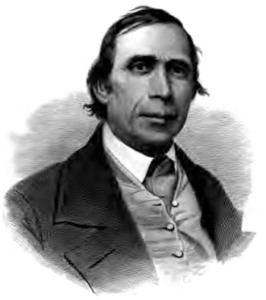
Jonathan Walker (portrait)
*Jonathan Walker's birth is celebrated on this date, c. 1799. He was a white-American reformer and abolitionist.
Jonathan Walker was born in Harwich, Massachusetts. During his youth, he learned to sail and became captain of a fishing vessel. In early 1837, he went to Florida and became a railroad contractor. The condition of the Black slaves concerned him, and in 1844, Walker aided several blacks in escaping in an open boat from the coast of Florida to the British West Indies, where slavery had been abolished.
After doubling the capes, Captain Walker fell seriously ill; the crew, unfamiliar with navigation, would all have drowned if a wrecking sloop had not rescued them and taken Walker to Key West. From there, he was sent in chains aboard USS General Taylor to Pensacola, imprisoned, chained to the floor, and deprived of light and suitable food.
Walker later wrote about the degrading conditions inside the jailhouse and the brutality shown toward slaves there. Put on trial in federal court in Pensacola, Walker was convicted, sentenced to be tied to a pillory", and publicly branded on his right hand with the letters "S S" for "slave stealer." United States Marshal Eben Dorr, who also traded slaves, executed the branding with a hot iron. Walker was then returned to jail, confined for eleven months, and released only after northern abolitionists paid his fine. For five years after his release, Walker lectured on slavery in the northern and western states. For instance, in 1847/48, he was on a four-and-a-half-month lecture tour with John S. Jacobs.
He lived in Wisconsin in 1855 and 1860 near Winooski, Wisconsin. He moved to Michigan around 1866 and lived near Muskeg. Known as "The Man with the Branded Hand," Jonathan Walker died on May 1, 1878, in Lake Harbor near Norton Shores, Michig n. He is buried with his wife at Evergreen Cemetery in Muskegon, who predeceased him by seven years. Their two youngest sons (born in 1843 and 1848) predeceased their parents, but two sons and five daughters survived both parents.
A monument was erected to Captain Walker's memory on August 1, 18. Walker was the subject of John Greenleaf Whittier's poem "The Branded Hand." But to some, it meant "slave savior." After reading a book about him called Trial and Imprisonment of Jonathan Walker, Whittier heard about Walker. The poem praised Walker's action. A plaque commemorating Walker was erected on the lawn next to the Harwich, Massachusetts Historical Society.